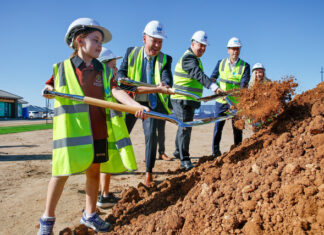Statement on appointment to the Shadow Ministry
IT has been a privilege to serve as Assistant Shadow Minister for Infrastructure and Transport for the past two and a half years and I’m honoured to be given the opportunity to now serve as Shadow Minister for Roads and Road Safety in a Dutton-led Shadow Ministry.
The Coalition entered Government in 2013 committed to building the roads of the 21st century and over the ensuing nine years invested record sums into infrastructure projects right across the nation helping to drive economic growth and prosperity.
he Coalition left Government handing over a 10-year $120 billion pipeline of infrastructure projects.
Unfortunately, the Albanese Labor Government has not had the same level of commitment to Australia’s infrastructure needs and has cancelled, cut and delayed almost $30 billion in infrastructure funding since 2022.
Australia’s road toll now sits at well over double the target set in 2021 under the National Road Safety Strategy.
Australia needs strong national leadership and renewed focus on roads and road safety. We need better insight into road trauma to ensure that road safety initiatives and infrastructure funding is being directed where it is needed to address the road safety crisis that has been unfolding on Australian roads.
As someone who drives more than 100,000 kms a year and who, as a local member representing primary industries who rely so heavily on road freight, I understand how important Australia’s 880,000 kms of road network is to safely connect people and goods for our nation’s economic prosperity.
Labor is failing Australians on the efficiency, productivity and safety of our roads.
It’s time to get our roads and our country back on track.
Member for Barker Tony Pasin
Five environmental drivers set to shape Northern and Yorke landscapes in 2025
1 – Water security
There is no doubt that water is featuring highly on everybody’s thinking, especially water security and navigating the drought.
Water, or a lack of it, has a pervasive impact on our natural resources, society and environments both in our region and around the state.
As water becomes scarcer, people are making every effort they can to capture and retain the water that falls on their properties.
This includes physical reshaping of parts of the landscape, planting shelter belts or careful pasture selection to ensure any rain soaks into the soil.
At the same time, these efficiencies can have a perverse effect on our natural waterways, by limiting the water available for our creeks and rivers that are home to important biodiversity.
Our water allocation plans are critically important in finding a balance for these agricultural, societal and environmental needs with an eye to longer- term water security. The Northern and Yorke Landscape Board is continuing
to lead work on the Barossa and Baroota Water Allocation Plans (WAPs), with plans to soon tackle the Clare Valley WAP.
Now is a pivotal time for many of the farmers in our region, with our soils being bone dry.
What’s important as a landscape board is focusing on how we work with our landholders to support them through these dry times.
Making the most of water is one thing, but so is looking at long-term opportunities and innovations related to farm diversification.
The carbon and biodiversity credit markets are options that are looming and we’re setting ourselves up to help farmers explore these enterprises into the future.
On the near horizon is important work to develop the next five-year State Landscape Strategy.
It’s a high-level document required under the Landscape South Australia Act 2019 that sets out the agreed priorities across the state and helps us to define our regional plans.
We’re doing that strategic design work this year, which will impact how the Landscape Priority Funds are spent and how we tackle issues like Buffel grass control, feral deer eradication and water management.
At a regional level, we’re continuing our work on the draft Guuranda – Yorke Peninsula Coastal Access Strategy, which aims to protect our coastlines.
We’re taking a collaborative approach to develop this strategy and then deliver actions like coastal fencing, revegetation, and valuing First Nations assets.
Pick up next week’s edition of The Bunyip for parts three, four and five.
Northern and Yorke Landscape Board general manager Tony Fox









